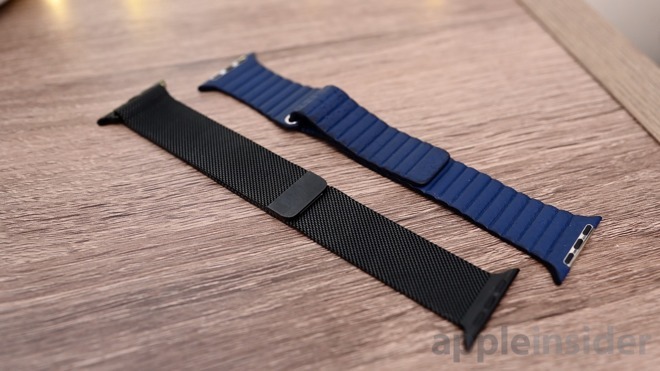A future Apple Watch band could have electrical and data contacts to do more things with the wearable, like allowing for a replaceable power source or the installation of sensors outside the watch, if Apple's research pans out.

The smallest computing device offered by Apple, the Apple Watch manages to pack in a considerable number of features into its diminutive proportions. However, while other devices like the iPhone or iPad can extend what they can do by having accessories inserted into the Lightning port, the Apple Watch does not offer any opportunity to upgrade the device past its base specifications.
Due to its compact size, as well as a need to prevent the appearance of ports on the outside surface to maintain its appearance when worn on a wrist, it is impractical to have a large connection point exposed on an edge of the Apple Watch at all. The implications for water resistance are also dire for such a situation.
For devices like an Apple Watch, Apple believes it is possible, but the connector has to be "space efficient, have a high corrosion resistance, difficult to damage, reduce or prevent moisture leakage into an electronic device housing the connector assembly, are readily assembled, and are reliable."
In a patent granted to Apple by the US Patent and Trademark Office on Tuesday for "Accessory Contacts," the company suggests a solution could be found in the form of contacts embedded within the connector used to affix bands to the Apple Watch.
According to the filing, the system would be somewhat reminiscent of the existing method of connectivity for Apple Watch bands, with a section that slides in from a side and is held in place using spring-loaded pins that pop into recesses within the Apple Watch body. A button can be pressed to pull the pin sections back, allowing the band connector to slide out.
An example of how a two-pin Apple Watch band connector could be wired up to provide electrical connections
In the patent's case, the pins would provide not only a point of anchoring, but also would serve as the way electrical contacts could be made. Connections from components on the band could be led to each pin, which springs up and presses against an internal contact in the Apple Watch body's recesses as part of the locking mechanism.
Again, a button would allow a user to control a sled holding the pins, retracting to sever the connection and to free the band ay the same time. Rather than a push-in type as currently used, it could also take the form of a sliding switch, one which can keep the mechanism in a sprung or retracted state.
This form of system can also allow for a plurality of pins to be raised into the Apple Watch's body, both to increase how secure the band is in the device itself, and to offer more electrical connections. This can enable, for example, one pair to handle power exchanges, while another could deal with data transfers.
An example of a sliding sled for an Apple Watch connector using four pins with electrical contacts
Other options include pull tabs at the rear end of the housing, a lever, and a rotary control.
Apple files many patent filings on a weekly basis, but while the ideas presented are not guaranteed to make it into a future product or service, they do at least show areas of interest for Apple's research and development efforts.
Apple has repeatedly explored the possibility of adding hardware to the band or strap in an effort to expand the utility of the Apple Watch. While this can be for more pedestrian uses, such as battery capacity, it could also be employed for items like a band-based camera, as proposed in a filing in June.
Adding light-up indicators to the band is another option, providing users with an image of statuses they wish to monitor, such as progress made through a day to close their rings. In January 2017, Apple revealed it had ideas to hide components in a modular strap, disguised as bracelet links, while in October it proposed making a self-adjusting Apple Watch band.
Hiding components in the band is only one way Apple has thought about Apple Watch expansion. In April 2018, it was granted a patent for backplates that can be added to the back of the Apple Watch, giving it enhanced capabilities but at a cost of making the device slightly thicker.


